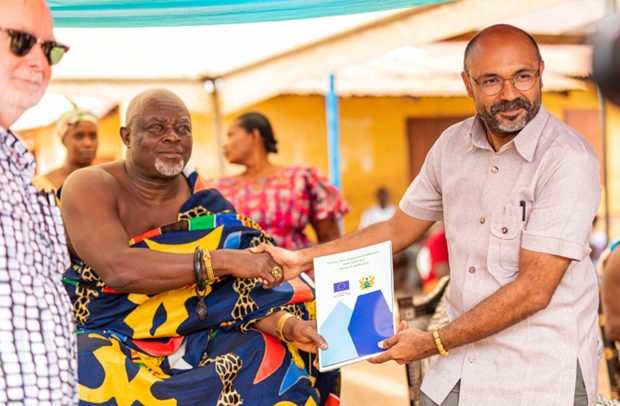The European Union in Ghana has planted 500 trees in Atewa Forest and launched its Green Development Pathways and Jobs for the Atewa Landscape report. The indigenous tree seedlings were planted at an abandoned mine site close to the Atewa Forest, adjacent to the Apapam community in Kyebi, Eastern Region. The event highlighted the untapped potential for green investments and jobs for local communities without harming the forest landscape, as part of larger efforts to preserve Ghana’s environment and biodiversity.
The EU’s tree planting supports the reforestation efforts by the Government of Ghana under the leadership of the Ministry of Lands and Natural Resources and the Forestry Commission. This includes the Green Ghana Day 2023, which took place on 9th June 2023 on the theme ‘Our forests, Our Health’, as a part of a larger campaign to plant 10 million tree seedlings across the country.
The EU event brought together representatives of the Government of Ghana including the Forestry Commission, traditional leaders, NGOs and partner institutions as well as the people of Apapam community. The activity notably involved youth groups in the Kyebi area and five schools in the Abuakwa South Municipal Area to provide them with knowledge on how to protect and benefit from their local landscape in a green way.
This was also the opportunity to launch the EU-funded report on Green Development Pathways and Jobs for the Atewa Landscape communities, which identifies viable green development pathways as alternatives to all forms of mining in the Atewa Forest Reserve. The study clearly demonstrates that jobs, business and investment that protect rather than exploit the Atewa Forest are viable options that offer genuine alternatives to harmful mining practices. These include programmes on Ecotourism development, Landscape Emission Reduction, and Sustainable Botanical Harvest. This clearly demonstrates that development in Ghana can be sustainably pursued without the negative repercussions on the environment.
EU Ambassador to Ghana, H.E Irchad Razaaly, emphasized that “Forests are essential to mitigate climate change and environmental degradation. They restore essential biodiversity, provide us with clean air and protect essential resources for local communities.”
Mr Daryl Bosu, Deputy National Director of A Rocha Ghana, reiterated the need for all stakeholders, government, traditional authorities and communities to support efforts to secure the irreplaceable forests and ecosystem services that the Akyem Abuakwa area provides, so as to serve as the foundation upon which to hinge a thriving green development agenda, for people, business and nature.
Background
The EU is actively supporting Ghana in preserving and protecting its land and maritime environment, in restoring the lost forest cover and in contributing to the global effort to mitigate climate change. Specifically fighting against deforestation, illegal logging and illegal mining through various projects and interventions including the Resilience against Climate Change (REACH), the Northern Ghana Integrated Development Programme (NGID), the Re-greening Africa Project and also the Green Ghana Initiative. So far, over 500,000 tree seedlings have been planted and growing well in Ghana particularly in the Northern belt.
The EU continues to partner with the Government of Ghana, businesses and NGOs for a more sustainable and greener Ghana. For example, the EU supports young entrepreneurs in circular economy through the GrEEn project (€ 20.6M) and sustainable agricultural practices through the EU-Ghana Agriculture Programme (EU-GAP) (€ 132M). The EU also supports forest fringe communities and other partners to implement the Landscapes and Environmental Agility across the Nation (LEAN) project under the EU flagship Sustainable Landscape Management Programme (EUR 4.9M) in three landscapes located in the High Forest Ecological Zone, Guinea and Sudan Savannah Ecological Zones, and Forest-Savannah Transition landscape in Ghana. Currently, the EU is preparing additional programmes on renewable energy and will offer more support to make Ghanaian agriculture climate-resilient and the private sector greener.


